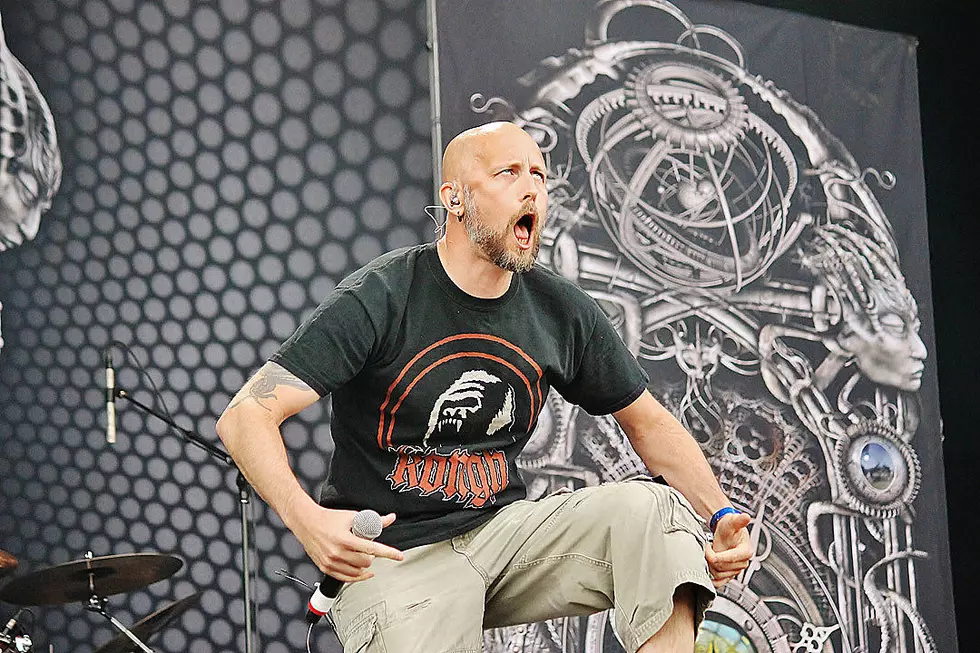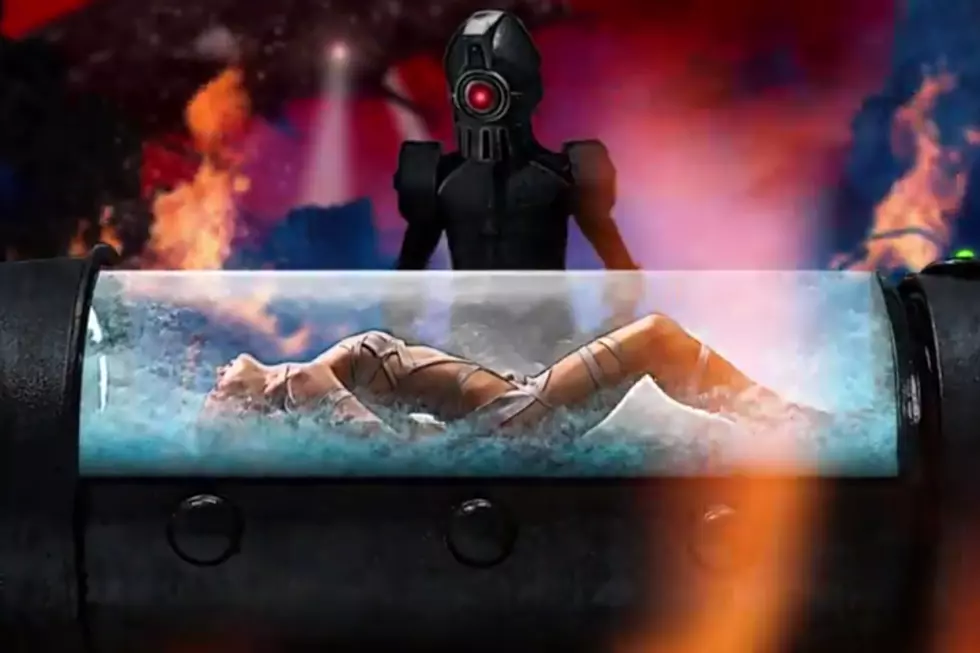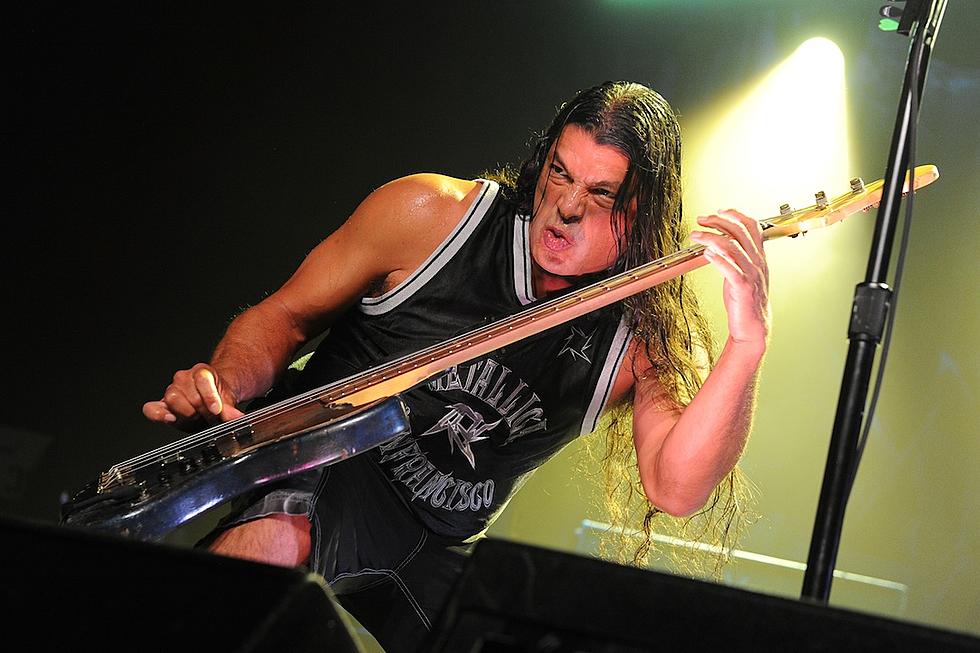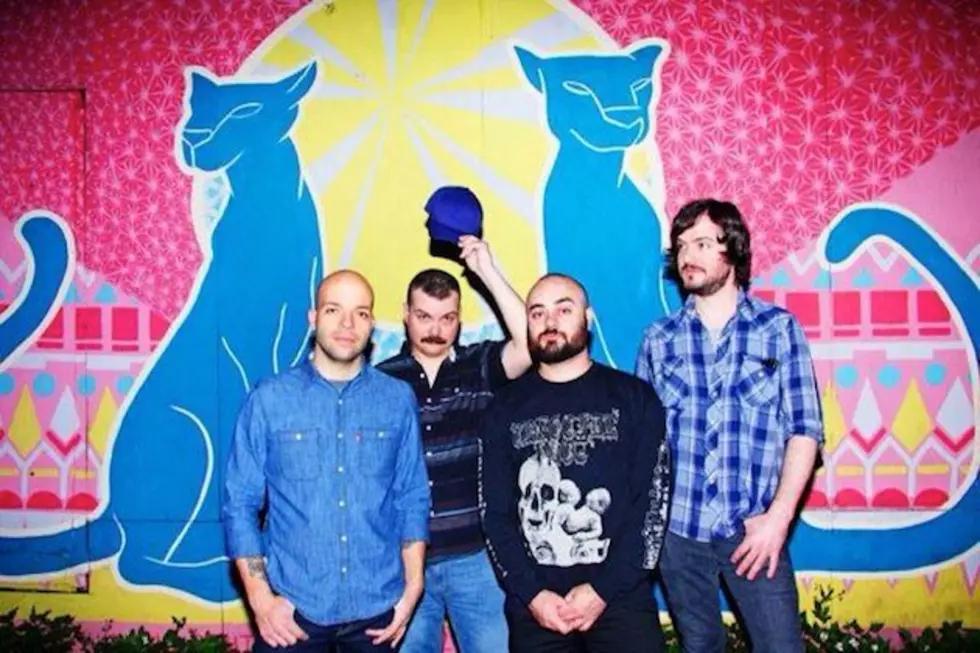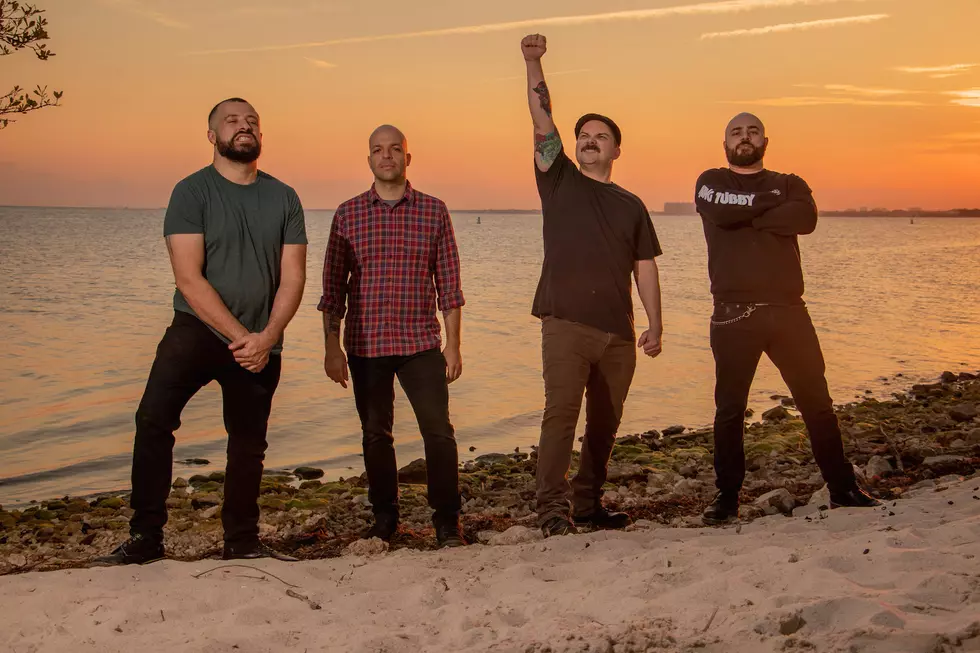
Torche: Any Influence Can Work as Long as It Feels Genuine
Torche's new album, Admission, is out now. It's their first in four years and, as always, they pulled in a variety of influences without forsaking their core sound. They're one of the chameleons of heavy music, able to change direction without altering their overall course.
Guitarist Jon Nunez spoke with Full Metal Jackie about the trials and tribulations of writing and recording Admission, what he loves about the process and a whole lot more. Check it out below.
It's been four years and a lineup reconfiguration since the last album. What does Admission reveal about the different band dynamics?
It's a record that clearly showcases the energy and excitement going into writing this record, playing live with the new lineup. The core of the band has been Steve, Rick and I for almost 16 years now. [We] just kind of worked through some stuff that maybe had some people second-guessing about continuing to do the band or maybe taking a break and stuff of that nature.
But after changing the lineup and doing a tour nine days after changing that lineup... if we ask our friend here, Eric, to be a bass player, is it gonna work? He was all about it. He was into it and we just jumped in and did a 30-day North American tour.
That almost definitely overshadowed any sort of preemptive feelings about jumping into writing another record or anything other than just going full force into writing and carrying on like we have, you know, in between any other record, just like, all right, we're torn but we're going to get back into writing mode and continue to move forward. So this record really captures the drive the energy and just honing in on things we've wanted to do post-Restarter, which is our last record.
[One of those] things is playing live arrangements we've might've had in our heads, so it's an accomplishment in that regard — a full record that really has a full album experience top to bottom. In our live sets, we can do that much easier because we're pulling from different albums. So I think subconsciously we wanted to pull that off in a one record scenario.
The palate of your influences is pretty broad. How does incorporating something far beyond left field invigorate you creatively?
I was thinking about this earlier and talking with some friends — if people had any insight into maybe what gets played in the van and even up coming up as a young kid in Miami in the late '80s... There's a 10-year gap between Steve and Rick and I. So I grew up listening to a lot of Latin music a lot of blues a lot of electronic music.
Then later I was like, oh, I like all these. And then after that my dad put on Van Halen. I knew it was over. I was like, what the hell is this? And shortly after I'm like, oh, I want to play guitar. And he's like, do you want to be like this? I'm like, I don't know. I just want to give it a try.
Then people your age start playing guitar or whatnot and you want to try that at least. I'm going to be conservative — I just wanted to try. When you see somebody your age play four chords through distortion, it's like, Oh wow, all life plans are different. You move toward what your friends are showing you. Your friends are showing you punk, hardcore and thrash metal— all right, what about Napalm Death? What's next? Come on, I need more and I need to push boundaries.
So with this, I think it pulls from a lot of different areas of our interests and stuff that comes from us naturally. But I feel that we are looking up to like achieve a continuity.
Based on how our amps are set, how we tune, how we play, we can really go from an upbeat kind of vibe to a super noisy, heavy dirgey sound no problem on the same release, but achieve a continuity because it's coming from a very honest place through our palette of what we create and what we listened to. It's like a pinball machine of musical inspiration and influences that translate through.
A lot of the stuff is written very spontaneously. It's like a spontaneous kind of culmination of inspiration and things that you want to, subconsciously or not, want to check off a list of like, man, I've been wanting to write a part like this, or I want to play a part live that dynamically accomplishes this feeling.
Or it can be like I want it this part with the drums and the bass player on, okay, cool, let's do this. Okay. And then 30 minutes later there's half a song or a complete song. We're not always that lucky, but there's always something pulling from somewhere and we don't like to sit down and dissect anything too much other than our own demos.
But there's always this ongoing influence of stuff. When we get together for tours, it's like trading cards showing each other music. Like kids trading songs, we're trading obscure demos or just touching on stuff that maybe we came across on the road, but no one really delves in and really been the first one to take the plunge into something new. It just keep things fun, I guess. And I guess that's where that wide-reaching sound maybe comes from.
Musically, nothing is off-limits when it comes to Torche songs. What's the most unusual direction that anything-and-everything approach took while making Admission?
Setting up limits is not something we really have for ourselves when writing or mixing or anything musically related. Even the artwork or layouts for these records, we tried to do something that has continuity to the music. So as long as it feels right, it feels genuine and translates to what's going to round out an album.... Sometimes we'll come up with some tracks and it's a great song but it's not going to be on the record — it should be a seven inch or something like a single or a B-side... But as far as what makes it onto these records, it should be a full-on all-encompassing experience.
Nothing is off the table. But as far this collection of songs, there's a certain continuity, whether you can break them off into little groups or look at it as a spread-out piece that is like a sonic journey that has its ups, its downs, it's heavier noisier stuff, the more melodic stuff, it should be a well balanced meal.
There was absolutely no blueprint for how it should be done. Not that anything we've ever done has had that, but this one especially was just a really collaborative effort. It was three songs that Steve brought to the table, three songs that Eric brought to the table, three songs that I brought to the table and then two other songs that were collaborations amongst us, like in the room together playing.
Even the other songs, there was stuff that each member added their part to change things up a little bit. That's what makes it fun is having every member leave their mark on it and it's exciting when it's on the track that you wrote because something can be reinterpreted or voiced differently, which makes it refreshing and exciting. We're always reaching for something different, pushing to not tread the same ground over and over while acknowledging we have a signature sound.
That's undeniable, but that's one aspect of it. The other aspect is every record reaching out further into what we're into, being more of what we've done in the past, but with new inspiration, new ideas to while bringing even more new ideas, new things to add to the band.
Not only are you part of the band but you were also on the other side of the glass handling the actual recording of Admission. What's the biggest challenge when it comes to tracking your own band?
There's this thing here called writing vocals on the fly now on the fly. Really? There's always a certain amount of tracks that are kind of left to be determined vocally and we'll sit in there in a control room and kind of brainstorm based off like melodies and I'll have a sing-along scratch vocal and we'll work our way from there. Some are done right out of the gate, but with recording your own band, I feel like everyone trusts me. Especially on this one, there was such a clear, clear vision of what I felt this record should be.
I was really translating on all those demos. I was actually designing the equipment — guitar heads, guitar cabs, bass pedals, guitar pedals, it's all just such an involvement. Designing all that stuff, all the demos would have these new sounds to introducing like dynamics, no matter how much distortion or low the tuning was, there was a movement that was really engaging us and you kind of leave it up for the group to decide.
In a sense, you don't, and be like, well, I'm recording this record. It's more like, Hey John, the demos are rad. How about you not only recorded like you've done the other ones, but we want you to just mix it. Just do it all because we're more involved than we've been in the past with how we want things to feel. We were capturing that in writing these songs and also in these demos that you've done.
So I was like, absolutely, I'm more than into it. I have no problems and I was super excited to mix it. And like I said, the equipment was designed for it and it's all versatile. It's not just for our sound, but I knew because it was versatile, it was going to make mixing it rather pleasant because there's not harsh, there's not, the clarity is there, doesn't adapt. That's really exciting to work with.
The performances were great. The room we recorded in was a little challenging acoustically, especially for drum sounds. That was the one thing I was like, okay, that'll be a challenge for this record. You know, the vocal thing, whatever. We do that every time.
Working with the acoustics in that room were a little challenging, but in the end, I think my goal was achieved and the band seems very excited and everyone's really happy with how this record translates to what we sound like live. It's a record that I feel someone can see us play live and buy it and put it on whatever format, turn it up and it's not going to be harsh.
The way it was mixed, it doesn't fall apart as you turn it up, it expands and sonically engulfs whatever space you're sonically occupying — whether it's a car, living room, kitchen, a bedroom, whatever, you know, it was mixed from the musician's perspective. And I always try to capture the sound of a band that is natural essence and really hone in on it. And that's what drew everybody in with the demos.
And that was the main goal was a real true, honest capturing of what Torche sounds like live the interplay between the instruments, the dynamics that go on and make it enjoyable and listen obviously. But really the first and foremost thing was what did these guys sound like? What are we doing? So it was a lot of fun actually.
But as far as challenging, writing some words here and there and some melodies were a little bit of a challenge. The room — the drum rooms needed some assistance, some treatment, but all in all it could always be worse. But yeah, it wasn't too big a challenge I guess as long as I kept the thing with keeping it honest. It's keeping it realistic, like a snapshot of where we are sonically, currently.
How does living a nomadic life provide you with creative inspiration as a musician?
It keeps you on your toes. You're always somewhere different and sometimes you revisit some points and sometimes it's a different perspective on this destination or location or what have you. But I feel like you are also able to take that adventurous route and go spend some time in Joshua Tree.
You're able to go find some nook in some city where you're like, wow this architecture is nuts. It's like fuel. It's like excitement — a reward for all the work you put in writing. From that time that you came up with the riff and it might have come easy, cool. Maybe another time it was stressful and you just couldn't get this idea to work. I'm not getting what I was getting yesterday or what I got last month.
When you're traveling, whether it's experiencing new food, meeting new people, seeing new things — there's no shortage of an A-Ha moment when you're standing at the foothills in the mountains or even certain just mega-metro areas. At night, just taking it in, like wow — this is a lot. All these things interactions with people, whether you know them or not, whether they're show related or outside of that realm. It's just - the music has taken me to these places - you're traveling.
You're really just enjoying the fruits of your labors and you're experiencing these new things. At the end of these trips and at the end of these tour support cycles for these records, you want to continue to have these experiences. And you also want to honor the experiences you had so you hone in on those feelings, which ultimately are inspiring you to grab your guitar or just come up with something. You want to go back to those destinations and you want to go to new ones.
You also are riding a sort of height knowing that your music has taken you places and will continue to take you places, both new and old or familiar based off how hard you work when you're putting in the work, writing the music, collaborating with other members, learning the riffs that they're bringing to the table. Recording the record, mixing the record, mastering — all of that work, it all pays off when you're traveling and out and the only reason a person like me, for instance, gets to go to Europe once or twice a year, that's all from the music.
If it wasn't for the music and the sacrifice that went into putting these records together, I would have not seen 75-85 percent of the places that I've been to. It's such a beautiful experience knowing that you put in all this hard work and wow, it really amounted to something and there's someone on the other side of the world that is excited about it.
As far as having a tattoo based off the artwork of the band, it's just wild and it leads to more experiences and more experiences and that's just the driving force behind it. You really do get as much out of it as you put into it, that's something - I come across that train of thought so much. I never sit down and ask, why am I even doing this? No. I know exactly why I'm doing this. I know why we all sacrifice so many things. It's just, there's a high you get while playing this music that is unlike anything else, this feeling of gratification and accomplishment.
Everything else melts away and you're excited to be on the other side of the world, but essentially you're going to this destination. Figuratively speaking, you're going to this place and that place is provided by the connection that you have with your band members creating this one thing as a group that you can revisit when you're together, playing together and the fact that you can do it abroad and travel based off this? It's pretty incredible to me.
Thanks to Jon Nunez for the interview. Grab Torche's new album, 'Admission,' here and follow the band on Facebook. Find out where you can hear Full Metal Jackie’s radio show here.
2019's Best Metal Albums... So far
More From Noisecreep
